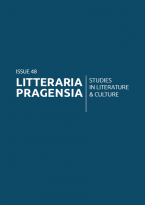
|
24.48 Between Romanticism and the Crisis of Modernity: The Mediatory Role and Transitory Nature of Emerson's WorkEdited by: David L. Robbins Volume: 24 Issue: 48 December 2014 |
Contents
|
David L. Robbins
Introduction: R.W. Emerson between Romanticism and the Crisis of Modernity
|
1 |
|
David Heckerl
Emerson's Mood of Culture and the Promise of Community
show abstract
An important aspect of what Nikolas Kompridis has recently called "philosophical romanticism" is the line of questioning, extending from Emerson, Nietzsche, and Kierkegaard to Wittgenstein and Cavell, as to whether our earnest cultivation of "knowledges" is in some urgent sense life-denying. A "knowledge" achieved through the vigorous conjunction of careful scholarship and bold theorizing may be said to define our current professional standard of research accomplishment, but does this defining investment necessarily provide all that a vital humanness requires, even for Homo Academicus? Such provocations unsettle our confident assumption that the production of "knowledges" necessarily sustains, rather than conceals or smothers, the vital currents of personal and public life. The question I wish to pose and explore here, largely through Emerson's writing, is whether the experience of culture as mood might be more conducive than knowledge production to the formation of sympathetic community |
21 |
|
David Dowling
Media Critic/Media Celebrity: Emerson's Quarrel with Mass Culture
show abstract
Ralph Waldo Emerson mediated the crossroads of Romanticism and modernity through his biting criticism of mass media, precisely the technologies and networks, the advertisements and machinery that were so vital in establishing him as the most significant media critic and celebrity of his generation. Alternately celebrating and denouncing the media as a mechanism for generating fame and dictating the tastes of mass culture, Emerson had become a major figure of mass culture himself, because he saw that the papers could be improved through young authors such as those he took on as his personal projects for professional development. His instrumentalist approach to mass media meant that he dedicated himself to its elevation in order to improve upon rather than dismiss its shortcomings. I argue that his contempt for the worst of the press was not evidence of his abandonment of mass culture, for he coursed through its channels incessantly, but instead was part of a broader diagnosis of its flaws directly serving his prescription for cultural and individual reform. That prescription specifically aimed to establish the most edifying personal and social dimensions of his romantic philosophy within the exigencies of modern mass culture by harnessing the power of accelerating communication technologies.
|
34 |
|
Blanka Maderová
Emerson's Late Work: Towards Deconstruction and Pragmatism
show abstract
Emerson's late work is, for some reason, still greatly disregarded not only in the European and Eastern provenience but also in the American sphere. Yet, his notions of will, power, creativity and self-identity coming from his Conduct of Life and other late works, influenced Friedrich Nietzsche and other "deconstructive thinkers" the most. I will argue, in this article, that Emerson's notion of power carries in itself the seeds of the deconstructive approach - developed also by Michel Foucault, Judith Butler, Gilles Deleuze and Jacques Derrida - as well as a non-material understanding of power. As I will try to show, Emerson evades the Nietzschean issue of (the often misinterpreted) "will to power" as Domination, while presenting a unique view of power as a dynamic creative potentiality. First, I shall explore what it means to be a powerful individual and what Emerson means when he speaks about self-reliance in his early and late work. Second, I will show that (and how) Emerson abandons the idea of participation in a transcendental Over-Soul, or Power, in his late work and turns to a more pragmatic and immanent conception of consciousness. What he preserves from his early approach, however, is his understanding of the performative power of words. One can clearly see the practical effects of his sentences - both in Emerson's life and in the lives of his readers, such as an increased feeling of power, courage and inspiration to create - which to a great extent explain his concepts. It will become clear that he openly draws on his experience instead of pure intellectual understanding. By contrasting Emerson's "Ideal Man" with several qualities of Heidegger and Patočka's notions of the self, I will try to highlight and develop the deconstructive and "existentialist" features of Emerson's late philosophy as a possible solution to what I see as our current crisis of (the notion of) power.
|
47 |
|
Michael F. Doyle III
Hemingway's Pursuit of Self-Reliance
show abstract
A comprehensive view of Ernest Hemingway's work reveals that Ralph Waldo Emerson had been a very influential figure for Hemingway. Surprisingly, Hemingway never mentions such an influence. In fact, he is very dismissive of Emerson's work. While they are both well-known American writers, stylistically they are very different (Emerson an essayist and poet, Hemingway a novelist and master of the short story). However, it is obvious that large portions of their work communicate the same message. Perhaps this is what makes Ernest Hemingway such a valuable symbol of the success of Emerson's vision for America. Nearly a century after Emerson planted seeds of self-reliance in American culture, Hemingway is able to test its validity.
|
66 |
|
Jeff Smith
"These Desponding Days": Emerson and America's Crisis of Textual Authority
show abstract
Americans in the era of the Second Great Awakening faced a problem intrinsic to Protestantism: the difficulty of grounding authority in a sacred text. Ralph Waldo Emerson's emergence from Unitarian circles immediately followed three native-born religious movements, each of which had focused on one aspect of that problem. William Miller's Adventism responded to doubt; Alexander Campbell's Restorationism took aim at sectarian disagreement; and Joseph Smith's Mormonism vividly sought to overcome dullness. Re-reading and even rewriting the Bible in increasingly radical ways, these movements represented three of the logically possible answers to the self-contradictions of textual authority. This essay argues for seeing Emerson's Transcendentalism as a fourth way. What linked this movement both to Unitarian controversy and romantic idealism, on the one hand, and on the other to the modern creation of a new, secular literary "canon" of America's own, was its immersion in biblical and textual anxieties. Recovering and re-employing the spirit behind the ancient sacred books, Transcendentalists insisted on rethinking not just the Bible but text-based authority as such - and like the other movements, they did this to counter a particular problem: in their case, an array of modern ills that Emerson summed up in the word "desponding."
|
79 |
|
David L. Robbins
Emerson the Nihilist, Redux Atque Resartus
show abstract
This essay examines the numerous ways, conscious and unconscious, explicit and implicit, in which Emerson's work - throughout his career, but culminating with particular self-consciousness after 1850 - subverted virtually all problematizations, methodology, and substance of received "religious" and "moral" constructions, replacing them with operational assumptions and practices that directly shaped the modernism pragmatism, fictionalism, perspectivism, and nihilism of the next generations of American and European intellectuals, both literary and philosophical. In the undertaking, the author examines Emerson's subject, philosophical, and public positions, as well as his direct modernist influence on Nietzsche and the James brothers, among numerous others.
|
94 |
|
Review of
Julia Boll
The New War Plays: From Kane to Harris
Basingstoke: Palgrave Macmillan, 2013. 192 pp.
→ Clare Wallace, Contemporary Theatre and New Wars. |
137 |
|
Review of
Bruce McConachie
Theatre & Mind
New York: Palgrave Macmillan, 2013. 82 pp.
→ Ákos Seress, The Limits and Perspectives of Cognitive Theatre Studies. |
140 |


